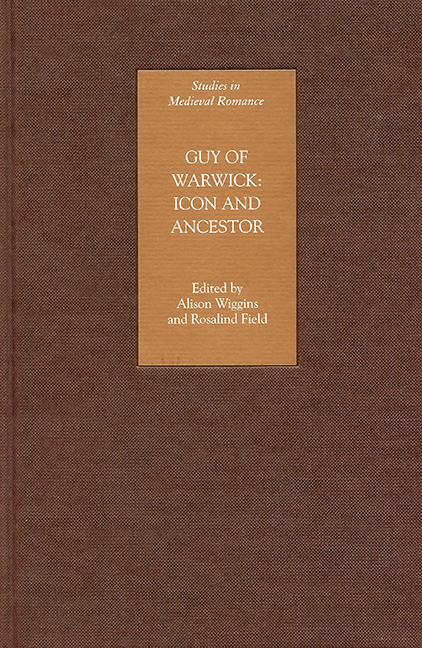Book contents
- Frontmatter
- Contents
- Illustrations
- Contributors
- Abbreviations
- Dedication
- Editorial Introduction: Namoore of this! How to read Guy of Warwick and why
- 1 Gui de Warewic at Home and Abroad: A Hero for Europe
- 2 Gui de Warewic in its Manuscript Context
- 3 Guy of Warwick as a Translation
- 4 From Gui to Guy: The Fashioning of a Popular Romance
- 5 The Manuscripts and Texts of the Middle English Guy of Warwick
- 6 The Speculum Guy de Warwick and Lydgate's Guy of Warwick: The Non-Romance Middle English Tradition
- 7 An Exemplary Life: Guy of Warwick as Medieval Culture-Hero
- 8 The Visual History of Guy of Warwick
- 9 ‘In her owne persone semly and bewteus’: Representing Women in Stories of Guy of Warwick
- 10 Of Dragons and Saracens: Guy and Bevis in Early Print Illustration
- 11 Guy of Warwick and The Faerie Queene, Book II: Chivalry Through the Ages
- 12 Guy as Early Modern English Hero
- Appendix: Synopsis of the Guy of Warwick narrative
- Index
1 - Gui de Warewic at Home and Abroad: A Hero for Europe
Published online by Cambridge University Press: 24 October 2017
- Frontmatter
- Contents
- Illustrations
- Contributors
- Abbreviations
- Dedication
- Editorial Introduction: Namoore of this! How to read Guy of Warwick and why
- 1 Gui de Warewic at Home and Abroad: A Hero for Europe
- 2 Gui de Warewic in its Manuscript Context
- 3 Guy of Warwick as a Translation
- 4 From Gui to Guy: The Fashioning of a Popular Romance
- 5 The Manuscripts and Texts of the Middle English Guy of Warwick
- 6 The Speculum Guy de Warwick and Lydgate's Guy of Warwick: The Non-Romance Middle English Tradition
- 7 An Exemplary Life: Guy of Warwick as Medieval Culture-Hero
- 8 The Visual History of Guy of Warwick
- 9 ‘In her owne persone semly and bewteus’: Representing Women in Stories of Guy of Warwick
- 10 Of Dragons and Saracens: Guy and Bevis in Early Print Illustration
- 11 Guy of Warwick and The Faerie Queene, Book II: Chivalry Through the Ages
- 12 Guy as Early Modern English Hero
- Appendix: Synopsis of the Guy of Warwick narrative
- Index
Summary
The thirteenth-century Jatvartharsaga, about Edward the Confessor, and the Chronicon Universale, which ends in 1219, both record the same story about a late-eleventh-century English emigration to Constantinople. A group of Anglo-Saxon nobles go and fight for the emperor Alexius, who is besieged by the Turks. Some stay as members of his bodyguard, others establish settlements further from the city. The story is based on the historical fact, recorded by several chroniclers, that English people settled in Constantinople from the 1070s onwards, entered imperial service and played a large part in campaigns against the Turks in 1081–84, earning the emperor's gratitude.
The early-thirteenth century Gui de Warewic differs from previous Anglo- Norman romances (by which it was certainly influenced and with which it was intimately familiar) because it is set against a huge historical and geographical canvas. It concerns itself not only with its hero's homeland but also with the portrayal of two empires, the Western and the Eastern – the Holy Roman Empire and the one centred on Constantinople. Its immediate predecessors, Boeve de Haumtone and Waldef, perhaps provided the inspiration, by widening their range of action from southern English or East Anglian home-bases to an exotic abroad, but they were not as knowledgeable as Gui's author about that ‘abroad’. This knowledge includes information that there was an English colony at Constantinople and that it was joined by a mercenary from England who defeated the Sultan of Konya. Gui de Warewic is also unusual in that, for its period, it gives a surprisingly favourable picture of the Eastern emperor as opposed to his Western counterpart. This chapter will address the question of what relation the romance might have to historical events, a question which in turn impinges on a possible date for the poem.
It has long been recognized that Gui de Warewic is extremely dependent on previous chansons de geste and romances. A. J. Holden's edition of Waldef, an Anglo-Norman romance dating from the very beginning of the thirteenth century, pointed out such numbers of verbal parallels between it and Gui that the latter's close reliance on it seems indisputable.
- Type
- Chapter
- Information
- Guy of Warwick: Icon and Ancestor , pp. 1 - 11Publisher: Boydell & BrewerPrint publication year: 2007



